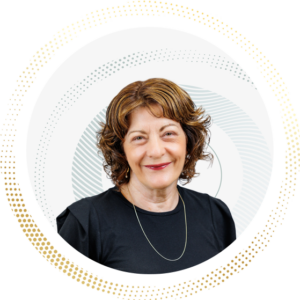Students in the library.
Commission for Diversity and Gender Equity
The Talent Scout
Bar-Ilan’s new commissioner for diversity and gender equity is working with partners across campus to nurture talent in groups for which a bit of extra support and encouragement can result in tremendous gains—for the University, for academic disciplines, and for Israeli society.
A More Equal University
When last year Pres. Arie Zaban decided to focus on the creation of an inclusive and supportive campus environment, it was obvious where to turn: the sociology researcher and then-advisor to the president on gender equity, Prof. Orna Sasson Levy. Having overseen, since 2020, the marked increase in the number of women serving in senior leadership positions, Sasson-Levy had shown that her work could indeed empower individuals to realize their true capacities. Now, Pres. Zaban wanted her to take on a new challenge: lead a commission to maximize the potential of Bar-Ilan’s diversity.
“The creation of the Commission for Diversity and Gender Equity is a statement by Zaban and the University leadership that it takes seriously its mission of educating Israel’s next generation,” says Sasson-Levy. “Israelis are an incredibly diverse group, and a true sign of our success must be ensuring that members of every group in society have an equal chance to succeed.”
To that end, Sasson-Levy entered office determined to help first-generation college students complete the full course of their degrees. “This is a group with a high dropout rate, particularly in the first year,” explains Sasson-Levy, “so getting to them early is the most important thing.” The commission had just begun to map these students’ needs and build a plan that included tutoring, peer mentorship, and involvement in the University’s social scene when Hamas attacked southern Israel on October 7th. From that moment, Sasson-Levy pivoted to yet another challenge: preventing war-related tensions from erupting on campus.
Explaining that her work advanced on two pathways—setting clear codes of conduct, and “creating the conditions for positive interactions”—Sasson-Levy began to seek out creative methods for facilitating coexistence. The results, which include the receipt of a grant from Yad Hanadiv to train residential advisors and another from the United Jewish Appeal to foster cultural understanding, underscore the value of a position dedicated to advancing tolerance and cohesion. “If not for the commission, these opportunities to forge human connections between different groups would have fallen between the cracks,” concludes Sasson-Levy. “And it’s precisely these connections and the sense of safety they provide that allow us to devote our full selves to research and education, and achieve the best possible results.”

Quiet on the Home Front
At the start of the new semester under the shadow of ongoing war, the Commission for Diversity and Gender Equity was tasked with ensuring that relations between Jewish and Arab students remained civil and respectful, and that campus would be a space free of incitement, coercion, and intolerance. Its activities in this regard included:
- A letter sent to all students setting out clear expectations for conduct and consequences for a failure of compliance.
- A letter sent to Arab students reinforcing their status as full and valued members of the Bar-Ilan community. Also, a series of meetings for Arab students to voice concerns and learn about University efforts to quell tension, directed by an academic consultant for students from Arab society.
- Workshops for lecturers on addressing and preventing tensions in class and setting the appropriate tone on the very first day. They included the use of the Learning and Teaching Division’s Swords of Iron Toolkit, which offers strategies forteaching in challenging periods using engagement, evaluation, and empathy.
Forthcoming activities include:
- A course—funded through a special grant by Yad Hanadiv—to train counselors in Bar-Ilan’s mixed dormitories in methods for advancing coexistence between Jewish and Arab residents.
- A project—funded through a grant from the United Jewish Appeal—for students in the Department of Geography and the Environment that uses tours of mixed, Jewish-Arab towns in Israel to teach about urban planning and coexistence.
- Workshops for students in the School of Optometry and Vision Science—60 percent of whom are Arab—to foster cultural understanding and a positive study atmosphere.